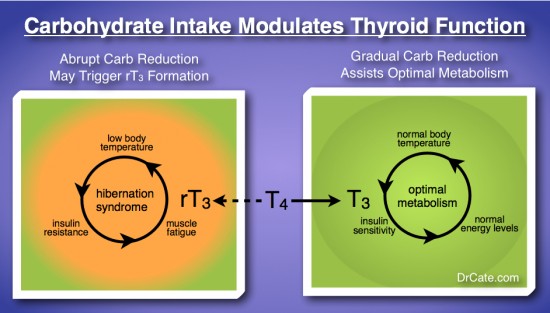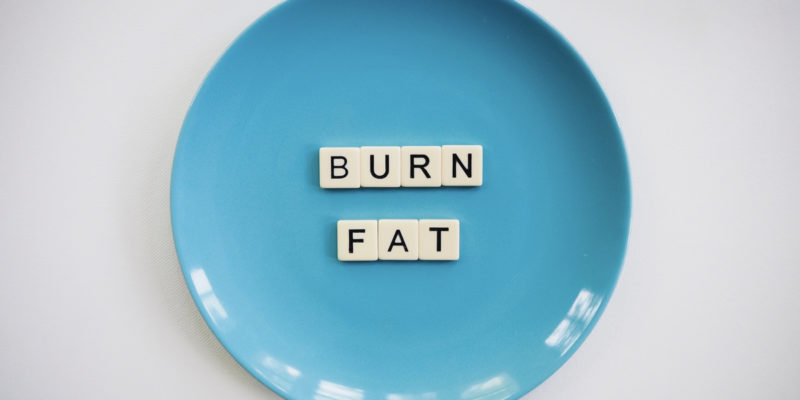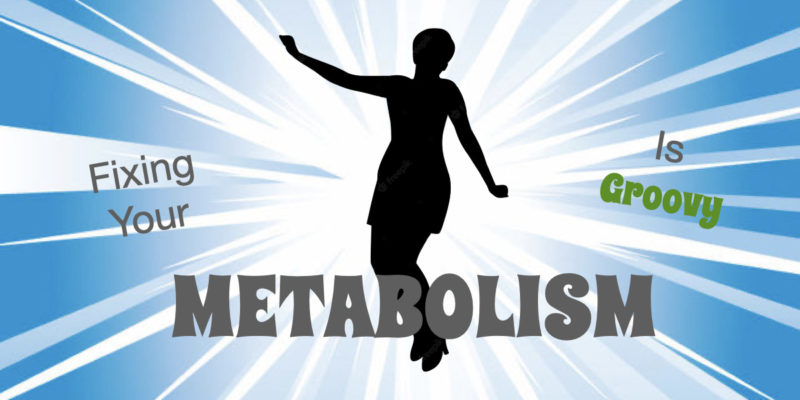If dairying began in the Paleolithic era, as I believe it did, then our genes have been depending on these nutrients for thousands of generations. Learn how your skeletal development can be sculpted by dairy products.

Going Low-Carb too Fast May Trigger Thyroid Troubles and Hormone Imbalance
Table of Contents

If you’ve been turned on to the low-carb Paleo diet craze, you may have noticed increased energy, better digestion, happier mood, and a shrinking waistline. Good for you. But some folks who’ve taken the Primal leap—particularly those who were previously on a high-carb diet—have been faced with unexpected side effects waving them back to the world of bread, sugary fruits and sweet potato casserole.
Interestingly, these side effects include a wide range of symptoms that are nearly identical to symptoms of severe thyroid hormone deficiency. More interestingly, lab tests often show normal or near-normal thyroid function. More interesting still is that these symptoms seem to only be relieved by adding back carbs into the diet, sometimes upward of 300 grams—a level I consider to be very likely to harm.
Why is this happening? Is it that low-carb simply doesn’t work for everyone, or is something else going on?
This article is continued below...(scroll down)
The low-carb conundrum just so happens to be an issue I’ve been pondering since reading about the controversy over safe starches. Recently, a couple of pieces of the puzzle fell into place that I think add up to at least one explanation for the debilitating symptoms and offer a method for anyone going low-carb to do so without problems.
Here’s what I discovered about those with thyroid problems.
Abrupt Change May Be too Much For the Thyroid
People who run into trouble going low-carb seem to follow a pattern. They follow any number of diets from SAD to vegan before making a relatively abrupt switch to a low-carb (often less than 50 gm) diet. At first they lose weight as hoped, but then, instead of feeling more energetic from their weight loss, they develop fatigue, sometimes accompanied by symptoms of low thyroid function, including cold extremities, hair loss, and digestive problems. Only by consuming more carbs again can they reduce these symptoms.
Because their fatigue and other symptoms are classic for thyroid malfunction, many will get their levels tested, only to come away confused when the tests health practitioners typically order (TSH and T4) come out normal.
Those who get more extensive testing may get a test called reverse T3, or rT3 for short. These are often abnormally high, leaving them to believe they have found the root of the problem. Some are given a prescription for T3 in hopes of regaining energy, and the intervention seems to help, at least a little.
Reverse T3 is a kind of chemical opposite of regular T3, a mirror image compound called an enantiomer. Reverse T3 has opposite effects of T3 and has long been associated with a set of symptoms aptly called hibernation syndrome—fatigue, weight gain, and so on. If you have suffered from severe hypothyroidism, you may have gone through times when you felt like you really just want to crawl away to a quiet place and rest for a long, long while. Your body was telling you to hibernate.

In addition to making our energy go dormant, high rT3 is also associated with increased levels of LDL, often in the 200s.
Interestingly, those who have added carbs back into their diet and have gotten retested find that their levels of rT3 have gone down without additional T3 supplementation. What’s more, if their LDL was high, adding carbs back to the diet also solved that problem as well, completely counter to the idea that carbs drive insulin which increases LDL.
I have to admit that though I have cared for thousands of people following low-carb diets, to my knowledge, none ran into this problem, so I paid very little attention to the issue with rT3. Only when I started reading about people suffering from thyroid side effects from following low carb did I started seriously thinking about that pesky little molecule. I wondered what it was supposed to be good for: Why would nature program our biology to manufacture a compound that seems to do little other than make people miserable and potentially clog our arteries?
The reason low carbing triggers thyroid changes
In doing research on rT3, I ran into a fascinating article on a group of little-understood compounds called thyronamines (pronounced thigh-row-na-meens). The key to understanding rT3, and unlocking the relationship between carbohydrate consumption and thyroid function, may lie in these newly discovered compounds.
Thyronamines have powerful effects on energy metabolism
Studies performed in 2010 showed that injecting thryronamines into the belly cavity or brain tissues of experimental animals cause the following physiologic and behavioral changes:
- Impaired ability to utilize sugar as an energy source
- Insulin resistance
- Lowered basal body temperature
- Weaker than normal heart contractions
- A marked decline in activity (We can’t ask the lab animals, but presumably, this would be induced by what we would describe as feelings of extreme fatigue)
Sound familiar?
Upon injection, the effects begin within minutes and last 8-12 hours.
And here’s the punchline: Thyronamines appear to be manufactured from that go-to-sleep hormone reverse T3. We can’t yet test you for high levels of thyronamines, but in testing your rT3, we are testing for the precursor of thyronamines. And I expect that, when studies are done in people, we will discover that high blood levels of rT3 do indeed correlate with high tissue levels of thyronamines.
I think this research is vitally important and that we will be hearing more about thyronamines in the future. But we are still left with a very important question that remains unanswered: What do we do about it?
For an answer, we can look to nature and find what I call The bear in the woods theory.
Changing from carb-burn to fat-burn demands new metabolic machinery
The bear in the woods theory suggests that it is the relatively sudden change from high carb to low that flips the switch.
Bears are omnivores, just like humans. And, of course, bears hibernate. Understanding the variations of a bear’s diet throughout the year helps us to understand why biology has built into our mammalian metabolism a sensitivity to changes in carbohydrate consumption.
Imagine you are a bear living in Yellowstone national park. It’s late summer, and the salmon runs are gone, the grazing animals born in spring have now grown too fast for you to catch, the grubs under the rocks are all hatched, and pretty much all that’s left, aside from campground garbage, is nuts and berries. Plucking ripe berries off a bounteous shrub is far easier than cracking nuts, so you gorge on berries. In a few weeks, though, the berries are gone, and there’s very little food left. That’s okay, because the abrupt decline in carbohydrate consumption is accompanied by increased reverse T3 and increased production of thyronamines, which makes you feel exhausted. Thanks to all the weight you gained, you are now so well-padded with cushy fat that you think you could just crawl into a cave somewhere and sleep for a long, long time.
Research in humans shows that, just like bears, our thyroid hormones are influenced by major changes in the amount of carbohydrates consumed.
For some, an abrupt decline in available glucose may trigger an atavistic hibernation reflex, which will trigger the conversion of a thyroid hormone called T4 into something other than the normal T3, namely into the reverse form, rT3. rT3 then gets converted into thyronamines and causes all the symptoms of low thyroid function without significant deficiencies of thyroid hormone showing up on lab tests, leaving people to worry there is something incredibly wrong with their hormonal function.
How do you enter fat-burning mode without going into hibernation? The solution is gradual change.
If you have gone low carb successfully, you have accomplished a major change in your metabolism, one that involves turning on scores of enzymes your body has not needed or used for a long time, decades in some cases. Not everyone can accomplish this overhaul in time. Those who can often continue low carb for life with great success. But those who cannot accomplish all the necessary changes flip the hibernation switch, and increase production of rT3 and thyronamines, which causes crushing fatigue and may lead to intense carb cravings in order to turn off the hibernation switch again.
For these people, an easy way to avoid flipping the hibernation switch and reduce carb cravings may be to simply make a more gradual reduction in carbs rather than an abrupt one.
Atkins, who advocates an abrupt switch to less than 20 gm per day, seems to have been aware of this problem, and in fact, in his writing, he warns people they may experience fatigue in the first few days or weeks after going very low carb. Unfortunately, for some people, the fatigue never improves, and they give up on low-carbing altogether.
Instead of giving up, I believe you can try again but next time don’t go cold turkey on carbs. Cut back gradually.
Incidentally, none of my patients reported feeling worse when they went low carb. I suspected it had something to do with the fact that I introduced them to low carbing one meal at a time beginning with breakfast. I made this recommendation simply because I didn’t have time to go over everything with them in one visit. I only had time to give them ideas for one meal, and had them start by cutting carbs from breakfast because that is the time of day we are most able to switch our dormant fat-burn enzymes from off to on.
Bottom line: If you jump into the Paleo (or any low-carb) program and hit a brick wall because of side effects, instead of giving up on low-carbing for good, add back your carbs until you feel better again and then try cutting down again, but go slow to give your body the time to adapt to the idea. This way, your low metabolism can gear up to give you the fat-burning benefits of hibernation without having to take the four-month winter snooze.

Please note: Please do not share personal medical information in a comment on our posts. It will be deleted due to HIPAA regulations.
This Post Has 201 Comments
Comments are closed.
Note: Please do not share personal information with a medical question in our comment section. Comments containing this content will be deleted due to HIPAA regulations.



















Thanks for guiding me here Dr. Cate,
I get it, so adapting to low carb is key to maintaining t3. I also wonder what you think is true for athletes who expend more energy, if they may require more grams of carbs, with increased overall expenditure?
Also, do you think that taking t4 supplementation may result in more thyronamines if rt3 mechanisms are in place?
Also looking forward to a phone consult, as I was coming to see you last week, but the drive is simply to far.
Kindly,
Bevin
Athletes do require more energy, but I do not think it would matter whether it comes from fat or glucose. Those athletes who are able to store more muscle glycogen would tolerate a higher glucose intake. And yes, to your question about t4 supplementation.
Thank you for the article! I went Paleo very abruptly and have had the hibernation fatigue and hair loss, and also a slew of severe PMS-like symptoms like irritability and depression. I hope the gradual approach will help.
Cool post Dr. Cate, maybe if you have a chance to work with someone that has had this happen to them and your able to coach them through it you could post about how you were able to help them. I know you can’t really give medical advice but to know it’s possible to transition over slower would be encouraging. I’m not really willing to go back to low carb because of the anxiety and everything else along with it, even after working with a practitioner that says “it works for everyone”.
Another trap you can fall into. You cut wheat and sugar, but you don’t have a lot of meat and cheese. Your body gets into a very alkaline state. You feel miserable. You wonder why your heartrate spikes when you take a vitamin c pill or 1/4 tsp of rice syrup. You eat more acidic foods like meat, cheese, and black tea and you feel like king of the world. And by you I mean me. No one talks about this except a local dr I know.
This is fascinating. Ive spent 2 years looking for info on “when paleo goes wrong.” I started paleo 2 yrs ago. Felt awesome. 3 weeks in, massive gallbladder attack. Fought my Gb, and these thyroid symptoms, for 18 months. Finally had the Gb out when I couldn’t tolerate the pain anymore. Now I’m working with a traditional foods nutritionist to get back in the game and resolve my prediabetes. Im resolving to not do Lazy Paleo, relying only on meat and nuts! Dark green veggies with every meal…
I’m still on my quest to deal with Very Challenging Symptoms…and am mostly coming up with more questions than answers! But it’s fascinating! And I just listened to a podcast interview with Chris Kresser last night, and took some detailed notes because I thought others might appreciate his thoughts on thyroid and hormonal health: http://www.lifeisapalindrome.com/updates/some-fascinating-facts-about-thyroids . His approach complements yours, Dr. Cate–thanks for continuing the discussion.
-Sara
Sara,
Thanks for sharing, very informative stuff!
Awesome article Dr. Cate!
I was excited to learn I am not the only one interested in the effects of hibernation. I’ve long thought it was so fascinating. Bears go to sleep in early Winter, wake up several months later with almost no muscle loss, tons of fat loss, little movement during the winter, they stay normal thermic, yet their HR plummets and they don’t even really drink water. Amazing.
Thanks!
Mike T Nelson PhD(c)
You are so right, Margarete. I sought the aid of a doc for hypertension. He gave me a prescription which lowered it to 140/80. I was not happy with this but was told it was okay at my age. Saw an endocrinologist to get hormones checked, told him about zero libido in addition to other stuff. He told me it was normal at my age. It’s wrong to tell people in their 60s they are old. I have contacted Chris Kresser & plan to see Dr. Cate (calling later today)
Both are about 45 min from me!!!
Lucky you to be near them! Good luck!
My doctor will tell me to take Prevacid or some other medication, I don’t trust medication…I do, however take my thyroid med daily. I refuse to take statins, too, they make me feel like crap. therefore I am trying to live a healthy life instead and eat well.
so, that’s why I think people will try to make these changes on their own, fearful that a doctor will either ridicule them or just prescribe some other medication or both!
Good advice. : ) One more question: if a woman had Hashimoto’s thyroiditis, is it caused by being low carb or would being low carb along with thyroid meds actually help that condition?
Thank you. Dr. Kresser is the reason I first tested my blood sugar and found it high. I’ll contact him.
Best of luck and tell Chris Dr Cate sent ‘ya.
Should he be trusted? He states that the paleo premise that “carbs spike insulin which causes insulin resistance” isn’t a fact. http://180degreehealth.com/2012/02/12-paleo-myths Would one with PCOS be best off eating a healthy diet (four pillars) with no veg. oil, packaged foods, sugar, etc. while staying on grains? All the medical attention that is required b/c of these “programs” are expensive not to mention all the food and supplements to help the conditions that result after the diet.
Kristen
While it’s important to read and learn online I find that sometimes one needs professional guidance to avoid feeling lost. Matt Stone is just one of the people out there saying low carb is dangerous, and there will be other people who say the opposite of everything else that I say. To really get to the root of your trouble, we need to get a more complete background including blood tests, family history and more, which I look forward to doing during a phone consultation. That will give me an opportunity to better advise you and give you an opportunity to decide if what I say makes sense to you. For now, rest assured that you are eating better than before, much better from the sound of it, and that is always a good thing.
Wow. When I read Matt Stone’s description in his Diet Recovery Book, it’s like he’s talking about me. This is the first diet I’ve ever done. Five months later, I have worse symptoms than ever. I did it to bring down my glucose levels. That worked but everything else seems to be falling apart. When my husband read Matt’s description, he said, “For the love of God, please read that book.” Ouch. I must be meaner than even I thought. : ) So what’s the verdict? Is he on to something?
Hi Dr. Cate,
You describe my symptoms perfectly! (Except my insomnia.) My rT3 is at the top of the normal range, else normal. Also my serum ferritin is below normal, am prediabetic and cortisol is high in the morning only. I’ve started iron supplements and considering Thyro-Gold. I’m scared to abandon the Leptin Rx (J. Kruse) I’ve been doing for 4 weeks. Any hand-holding/specific advice you can give on how to best reintroduce carbs would be very much appreciated! Thank you thank you thank you
Jill
I’m seeing a theme here of folks getting into trouble with diet changes made on their own.
For anyone serious about making diet changes for their health but has run into trouble doing it on their own, it may be time to seek professional help. Remember, the food you eat informs your genes and has a profound effect on your health, so diet changes are a kind of medical advice. You probably want to get medical advice from people who are highly trained and trustworthy.
I trust Dr Tom Cowan and Chris Kresser, both are available now, and starting in May I am going to be offering online services as well. (see the tab Make an Appointment)
Hi Dr. Cate,
Can you explain why the low carb diet can produce so much gas? since I went gluten free a month ago, I have developed horrible GI symptoms, lots of noise, lots of gas and a mucus in the back of my tongue whenever I eat anything that is not fresh food, even a protein bar or protein shake will send my stomach reeling.
Probiotics may help. I don’t advise protein bars or shakes, for reasons described in Deep Nutrition. Our next book (due this fall) will offer a step by step guide for diet rehab, and in the meantime if you continue to have trouble you may want to consult a professional in your area or online, either myself or Chris Kresser.
Thanks you for a quick reply even on a Sunday! I did start probiotics, but thought that they are adding to my gas issues. I do want to contact you when you offer online services, pls let me know how to do that and how much it will cost! Thank you!
Margarete:
Here’s the info from our Make and Appointment Tab: For those who cannot come to my office, starting in May 2012 I will offer telephone consult between 1 and 3 on Wednesdays and Saturdays. The fee is $175 for 30 mins and $325 for an hour. Payments must be made in advance via paypal. If you would like to reserve a Wed or Sat appointment in advance, please send an email with the date and time you would like to admin@DrCate.com
Currently the first appointment is May 9, the 4-5 slot. Email us with the time you’d like to reserve at admin@drcate.com and when the scheduling function goes live we’ll send you a link. Until then, be well!
Thank you very much!
Dr Cate – I felt encouraged and felt hope finally after reading that you will be offering telephone consults but after seeing what you charge I am frustrated and see that I will be unable to afford it.
The cost of health care is out of reach anymore and for those of us w out insurance and unable to work because of health issues, we are really stuck…will you be offering any kind of sliding scale?
Yes it is sad. Especially as insurance doesn’t pay for doctors to do the counselling on diet changes or nutrition that could help so many people. So right now I am doing only very limited phone consultation. In the future I may get more sophisticated and offer other payment arrangements.
So enjoyed your talk on Paleo Summit, learned much about bone health, supplements, etc. On LDL however, you indicated have never seen LDL fail to go down on low carb. Mine has been going up over 18 months, as it did for others linked in a cholestrol post here. http://perfecthealthdiet.com/?p=4457
My triglycerides are only 20, HDL 85 and have a good NMR lipoprofile, but an LDL of 155 looks bad according to current standard of care. Can thyroid interactions described here cause high LDL longterm?
You offer a perfect example of the pitfalls of focusing on numbers rather than what you are doing an how you feel. The interpretation of numbers changes all the time, and standard of care lags behind actual thought. At a Bariatric society meeting we learned that the most important ratio is Triglyceride divided by HDL.
I think slowly reducing carbs is the way to go. Reducing too fast is very stressful on the body. Your heart rate and blood pressure will rise. I wouldn’t hesitate to have some evil white bread or potato when you feel the adrenalin start to flow. At least it doesn’t have fructose. If it doesn’t feel good, you’re doing it wrong.
Thanks for the reply Dr! Good answer, but left out some details, the frequent urination is something I have had all my life, after persistent bet wetting even when I was 12 years old, I had an extensive medical examination. they could not find any medical cause. thankfully I finally quit bedwetting by setting an alarm around 1 am every night to wake me up to go, after about a year I started waking up normally. I may have to try the pumpkin seeds, how to you prepare them?
I enjoy them raw, but they’re even more tasty when sprouted and lightly salted and health food stores usually carry pumpkin seeds prepared this way.
Hello,
thanks for your explanation, Dr. Cate. I am trying to go paleo slowly, though I am wondering about one thing – I have this “calorie counter” which helps me see how much of carbs, proteins do I eat. But even if I remove all the grains, I still have over 30 g carbs per day. At least. It’s almost impossible to do without them. So how much is low enough? How much do you think is too much?
I advise people to do one meal at a time starting with breakfast. 30-70 gm would be the final goal for all day. Details will be addressed in our next book, which will lay out a program for adapting traditional diets for weight loss and optimal hormone balance.
I’ve tried going at it very slow and just don’t seem to digest it…from what I’ve been reading it seems it’s essential to eat the fats in order to switch from carb burning?
Correct about the need to eat fat w/ protein. This is why Meat on the Bone, meat with all the parts (skin, fat and even bone, see Chapter 7 of Deep Nutrition) is helpful. My next post will allude to this as one of the pitfals of some Paleo programs.
Quick question- any thoughts/reccommendations on how to go low card (something i know i need to do because i CRAVE them relentlessly!) when i dont tolerate fats?? (gallbladder out years ago) ive tried taking ox bile and plant enzymes high in lipase and no help. Tried going primal and added lots of meat/bone broths andn duck fats and ended up in the hospital so sick from the fats! (didnt realize that was the issue until later) Any thoughts??
Thank you so much for your research and time w us!
It’s essential to go slow, ie don’t add too much fat at once. Broth can be skimmed so you remove the fat, if you want to be able to keep that aspect of the diet unchanged.
I tried to eat low fat, high carb diet for years–I ate lots and lots of carbs. Because I have hypoglycemia, I would eat frequent meals with lots of carbs to try to keep my blood sugar from crashing. Then I learned about low carb as a better way for hypoglycemics to eat. At first I felt better and lost 20 pounds. Then, even though I have tried to keep my carb counts to around 20-30 per day, I stopped losing weight for weeks and I feel terrible! like my blood sugar is crashing …
Carol
Good for you for working so hard. You may not be getting enough nutrients/exercise/sleep. Including all four of the Four Pillars of World Cuisine is essential to healing your metabolism, and you may want to work with a bariatric or low carb physician in your area to help with your fatigue.
Hi Dr. I have been low carbing for a few years now, lost excess weight, but I have felt much better and had more energy by eating only 4 pillar food the last 2 months. that seemed to be the final step to rid me of a few symptoms from my other low carb diets, like the zone, and protein power diets, like low energy, and headaches, but one annoying problem that persists is frequent urination. if i am real strict on my eating it actually gets worse, or if I fast. Is there any foods that cure this?
Michael
You definitely want to get your symptoms evaluated by a medical practitioner to make sure there is no infection, inflammation, or other process that may need to be addressed. After that, then I suspect an herbalist or naturopath may be able to make a recommendation for something that would facilitate the production of protective mucus in the bladder. For example, pumpkin seed has been effective for some.
Thanks! I just realized that what I’m going through is thyroid-related in the last month, when I finally did some bloodwork and connected the dots. I started taking pure dehydrated thyroid gland (thyrogold) 3wks ago, and am slowing upping the dose, hoping to see some good.
Sadly, the thyroid & adrenals are some of those nose-to-tail parts I can never get the butcher to return to my farmer when they slaughter the pigs & cows we buy. I’d much rather just eat it than take it as a medicine!
halleluia! you just confirmed an hypothesis i had formed about WHY a hypothyroid like myself can do so well on very-low-carb — thanks! i SUSPECTED that, in the studies that showed low-carbing diminishes thyroid function, the subjects were not well-adapted beforehand!
i did Atkins before i discovered Paleo; by means of a month of very restricted eating and then reintroducing foods, i’ve discovered sensitivities to things i never suspected before. now i feel 20 years younger.
Good for you, keep it up!
This post and Matt Stone’s theories on rebooting one’s metabolism are actually making it all come together for me.
http://180degreehealth.com/2012/01/diet-recovery
Thank you! Pam
Hi Dr. Cate –
This post describes my recent symptoms – but after being low carb for about a year! I seem to have hit a wall – fatigue, dry eyes, low stomach acid, dry skin, low body temperature. I started adding some safe starches but that only helped my eyes. Now I am feasting to raise my body temperature and come out of “hibernation”. I have never felt better eating more starches/grains. I am guessing this is a short term fix until my body temperatures stabilize. This post and Matt Stone’s
… but as an out-of-context state. His theory is very similar to yours, but his solution is not to change to LC or VLC gradually, but to employ cold thermogenesis. His clinical experience & his own n=1 have shown CT reversing disease pathologies & helping avoid the low thyroid problems I’ve experienced (yes, my TSH is low, but my fT3/rT3 ratio is dismal at 7.0).
It’s laid out in his recent (typically cryptic) blogs. Sounds like you’re hitting at the same thing from different angles.
Cold thermogensis affects your metabolism in a similar way that vigorous exercise does but it is possible that is may have additional, unique effects.
Hi Leigh.
I came across this comment just recently. I can see the dialogue is almost an year old but I was wondering what happened with you. I am in a similar situation and wonder if you found a solution. Thanks
I started taking natural dessicated thyroid (Naturethroid) and saw a great improvement as I gradually increased the dose, but to a limit. There’s still something going on. CT has helped some things, but not my thyroid, although I do usually forget to do it more than twice a week. (30m in 50F water is no longer a problem.)
I’m working on adding iodine (after first becoming selenium-replete) and dosing T3 two hours before I wake. I’m thinking of trying some pro-mitochondrial supp’s next (ubiquinol, d-ribose, etc.). We’ll see what happens.
Dr. Cate, I am one of those you describe perfectly – except I transitioned to VLC over about five years, starting with going from “CW healthy” to WAP/TF, and moving to primal, then eventually paleo. Still, the lower carb I go, the more I resemble what you describe.
I’m interested on your opinion on what Dr. Jack Kruse has been saying about this in the last week. It’s fascinating the timing – he is describing hibernation preparation as exactly what causes diabetes, not as a disease state,…
I adore Dr Jack Kruse (and his Quilt). But if it results from a history of poor nutrition and makes you feel sick, I’d say it’s a disease state.
So, I don’t have diabetes, or anywhere close, but as I mentioned, I went low carb very slowly over five years, and consume a 100% pastured/wild/organic diet with plenty of organ meats, broths, & ferments. No industrial foods at all. Still, my thyroid function seems to be crap.
I have no intention of returning to high, or even moderate carb intake, because it triggers binge eating in me, but I’m wondering what is going on with people like me. BTW, I’ll keep you posted on whether CT helps.
Yes, I’d be very curious. BTW, someone with your good diet could perhaps benefit from supplementation w/ either thyroid or perhaps adrenal hormone compounds if the CT and/or interval training workouts don’t fix things.
I think I may have a deeper issue. I slowly eased into a lower carb diet, first by eliminating sugars, white flour and mixed flour products, then all grains, legumes and most fruit. I started out last September, but still ate potatoes, carrots, turnips, pears and apples occasionally until January. Despite my slow transition to a pretty low carb primal diet, I still am waiting for that burst of energy promised. I am made an appt with an endocrinologist. Thanks for the post.
Keep in mind there’s a lot more to a balanced diet than cutting carbs! You also need to avoid the MegaTrans fats and get all of the Four Pillars of world cuisine into your body.
I think you missed the key word primal in my comment. I use only pastured eggs, grass fed butter, grass fed beef, pastured pork and free range chicken, only organic veggies, no commercially prepared foods whatsoever. I cannot abide liver. I eat Bubbies too! And drink occasional kombuchu and put lassi on my berries. I just do not eat bones, but I went and got some oxtails and some large bones to make stock. I hope that is enough.
I hope you can get to the root of your fatigue. All the good work you are doing to eat well will certainly assist with whatever else may be the issue.
Dr. Cate, can you please suggest a source (book or website) for good, reliable and vetted thyroid information? There seem to be laundry lists of hypo symptoms that seem to include everything under the sun. How do you sort it all out and figure out what’s normal with low carbing and what really is from hypo and needs treatment, then how to treat it? My HMO won’t even test T3 or rT3–I’m afraid to let them treat with incomplete data and approaches.
Unfortunately, most of the books I’ve encountered do not discuss the role of underlying nutritional imbalances and inflammation, and without that kind of consideration the rest of the advice falls short. So I can’t offer help with that one. I would recommend you work with a low carb doctor in your area or one of the paleo doctors from Robb Wolf’s list.
Janknitz (and Dr. Cate!)- I recommend checking out http://www.thyroidbook.com.
It’s an excellent book on the real underlying causes of hypothyroidism (whether they be autoimmune, pituitary, hormone related, etc.) Inflammation and autoimmune diet triggers are a huge part of the problem!
I’ve had really good results with my own thyroid problems using the protocols outlined in the book and a Paleo-type diet. I recommend seeking out one of the practitioners on the site.
I agree with his low-carb approach to treating the underlying cause of thyroid disease. Low carb works well for disease processes arising from inflammation, as thyroiditis is, as well as other diseases arising from hormone imbalance like PCOS, leptin resistance, infertility, weigh-loss plateaus, etc.
I’m curious….when did you switch to the Paleo camp? In Deep Nutrition, you refer to rice, pasta and sprouted bread. Now do you teach no grains at all? Have there been any studies done on the long-term effects of a grain free diet? Trying to make some decisions about how to proceed. Thanks!
Regarding the post above, one quote says, “PCOS is one kind of infertility which is reversed by low-carb diets when insulin and leptin sensitivity are reclaimed. However this will not be the case in those with severe adrenal dysfunction.” How does one know if they have “severe adrenal dysfunction”? Is there a list of doctors/naturopaths that help with these complex issues?
HI Ann
Paleo, referring to the Paleolitic era, is by definition a kind of traditional diet. It’s a little more restrictive than what I recommend, at least in the form some people describe it, but unlike adherents other diets, Paleo is not driven by any single person’s ideas, but rather by the body of science that describes what people in the past have done. Due to this built-in flexibility, Paleo is open to change. Paleo 2.0 is an example, and within Paleo there is increasing momentum toward traditional diets as a whole. If you are interested you should check out the Ancestral Health Symposium coming up this August.
If I’m reading other’s comments correctly, to correct the thyroid issues, you recommend increasing the carbs gradually…not necessarily the grains? Thanks!
Correct. Whatever form of carb you prefer.
Eating soluble fiber before the other food seems to be helping with the pain and explains why I’d have major episodes after a salad or spinach/salmon (healthy foods). My system can’t handle the insoluble fiber by itself. I hope this can help someone else. But, I hesitated to refer anyone to her site b/c her prescribed diet is low fat/no red meat/no dairy…depressing thought. Thanks again for trying to explain what’s going on with all of us who aren’t quite feeling like Mark Sisson’s gang.
Thanks for doing the research. This article gives me a lot to think about.
Good luck with your new consultation system… we newbie low carb / paleo people can use all the help we can get and you especially have been incredibly generous with answering questions. Thanks again. Best of everything.
Thanks Dr. Cate. Excellent exposition!!!
What’s missing here is the idea that all carbs are created equal. Get plenty of vegetables and you will have enough carbs. Adding back “grains” is not the solution. One would think this is common sense. Apparently not.
Fantastic. I went from a low-fat vegan diet to a “primal” diet overnight. I got very thin very fast, but could hardly move my limbs or stand for 3 minutes without stopping to lie down. One component I’m still confused about is that I also got severe joint inflammation that progressed over a period of three weeks to include every joint in my body. Got about 75% resolution of joint issues upon reintroduction of starch, but pain worsens whenever I eat legumes or red meat.
In addition to the cutting carbs too fast, there are a series of problems one can develop from adding meat too fast. One solution for some is to drink 3qts water per day and make sure you get plenty of natural salt. These all will be included in our next book.
What about an elevated ac1 level in a non-diabetic while on a long term a low carb diet – just curious. Does low carb bring about an elevated ac1 in some people as it does a rT3?
Thanks!
Do you mean A1c? Low carb brings down A1c.
🙂 While on Paleo for over a year I was experiecing the symptoms you mention in your post. Convinced I was low thyroid, I went to the doc for tests and came back with normal thyroid labs, but found a 5.9 A1c level.
Chris Kressor has had clients on paleo with high A1c levels, so the low carb has not lowered it for me; I wonder how many others may be experiencing the same issue. I thought I would ask in case you had done research in low carb and the effects on A1c as well as the thyroid.
Continuing with low carb will drop that A1c. It may have been higher before you went low carbing. Your AM fasting glucose level is also good to follow.
…getting the fuel it needs/expects, and the RT3 is turned down. They are now back to square one.
“For these people, a slow low carb might be the right thing. Switching from burning sugar to burning fat is not an easy thing to do. It is a major metabolic change.”
I’d love to hear more about your opinions on this.
Regards,
Sarabeth
Sarabeth Your friend is exactly right! In a person who has been burning carbs for decades, not getting to the point where the ever need to burn fat, there are scores of known enzymes and likely many unknown that need to be manufactured from scratch by genes that may also themselves need to be revved up again in terms of their expression.
I’d also be curious whether grain opioid withdrawal figures into the carb-flu. Perhaps easing off grains first, then attacking other carbs might be a more cautious approach? We all have heard the quip about having to eat again 10 minutes after a meal of Chinese food, but the opposite is also true.
I had the Chinese family next door over for dinner one night. We had a huge spaghetti dinner complete with salad and garlic bread (this was long before my celiac diagnosis/paleo lifestyle). Several weeks after, the wife commented she had to go home and have a bowl of rice before she felt full enough to go to bed. Perhaps she was missing her rice opioids, just like we miss our wheat opioids?
but since your insulin is still high, you are not burning fat efficiently either. So your body ‘down-regulates’ your thyroid (i.e. slows down your metabolism) to compensate. It accomplishes this by increasing production of RT3. For some people, this is a temporary condition which resolves itself as soon as the insulin resistance is overcome. But for others who are very resistant, I suspect, this condition may continue for a long time. So they eat carbs and feel better. Their body is now…
My friend had the following comment: “I suspect that the people who have problems with ‘going low carb too fast’ are precisely those who suffer the most from insulin resistance. Of course, this is only a guess, but here’s why it makes sense: If you are insulin resistant, your basal level of insulin in your blood is chronically elevated. This prevents you from releasing fat from your adipose cells to burn as fuel. So when you reduce the carbs, you reduce the fuel your body needs to function…
You are describing my low energy symptoms to a “T”. I started low carb again in late fall of last year following a stroke in Jan 2011. I’ve lost 30lbs. My neurologist ran Thyroid tests showing slightly lowered numbers for T3 and 4. He actually “prescribed” a can of caffeinated soda pop a day!
I still am fatigued. Your description is exactly how I feel.
I hope your book comes out soon because I feel I need a better-guided plan to lose the 100 lbs I must lose and return to my energetic self.
(p.s. – Android voice to text can work really well once you’ve trained it for your voice. Just a thought. http://www.makeuseof.com/tag/free-hands-speechtotext-android/ )
Hmm…
Low BP – yep, cold limbs- yep, fatigue – oh yeah. No hair loss, digestive probs all the time, on various diets, resolved by fermented live foods. No real weight probs. Fasting was sheer hell for years.
Virtual visits could be perfect for someone like me. Fill out a long form? Complete a reading list? Submit requested lab tests? THEN a live chat consult – thus a written record? That’s my M.O.
U’ve been swamped, am i right? Condense the process, i’m all 4 it. Happy to pay, not 2 waste time.
You got it. Lots of work to do on that goal, but I’m looking forward to helping more people this way.
I look forward to your new book and to meeting you in May. In the meantime, do you recommend a low GI diet with real food? Also, would a soluble fiber supplement be ok for a sluggish system? I was specifically looking at the recommendations from http://www.helpforibs.com. A low carb diet causes constipation and laxatives are a no-no. But, it sounds like regular use of a safe soluble fiber supplement can help with that and with blood sugar levels.
You could try a soluble fiber supplement for a few weeks to see if it helps. I do not find the GI to be useful in guiding my dietary advice, however.
Hi Dr Cate! What is the cause of sore muscles and stiffness from going low carb I have heard of this has lasting for 2 months, with no other symptoms. Can you discuss the muscle pain?
Lots of potential causes, which will be going into the troubleshooting section of our next book. One of the simplest is failure to hydrate.
can’t wait for the next book! any idea on the release date?
We are hoping for completion by August 2012…fingers crossed!
Hi Dr. Cate,
The bear-in-the-woods scenario you describes would absolutely mirror my experiences, except for the fact that I was eating fruit and nuts (i.e. not eating very low-carb) for a whole year before I _truly_ went “low carb” (i.e. no other carbs besides veggies and the
small amount in fermented dairy). And then it was another nine months of this supremely nutrient-dense low-carb diet before I got pregnant, which probably put a great strain on my thyroid, and was the point when I hit a wall in terms of dealing with the eight years of increasingly acute and chronic stress of raising my oldest son who is ASD.
Now my labs are showing T3 at the very bottom of the “normal” range, and my salivary cortisol is low when it should be high, and high when it should be low (and probably low overall, since it’s supposed to be much higher during pregnancy–it’s hard because I have no pre-pregnancy labs with which to compare).
But maybe in some individuals, it just takes longer to rewire things… What do you think? Another thought I’ve had, sometimes, is that maybe it’s actually a more complicated set of malfunctions that occur when a person eats a high carb diet, as I did for 30 years, without gaining weight. It sort of seems like gaining weight in such a situation is the norm, and the dysfunction that happens to people like my husband and me, who DON’T gain, almost seems more serious in some cases!! But maybe I’m just making this up.
Am very eager for your thoughts, and am very glad that you’re looking into this, because I am sure that eating more carbs is not the solution for me–I did that for 30 years, with many unfortunate consequences (even though everyone thought I was perfectly healthy because I wasn’t overweight).
I’m unclear what to do with a body that has crashed during such an “inconvenient” time as pregnancy, though. I say this while lying in bed with total fatigue and exhaustion, as I battle incredibly bizarre food revulsions as well as panic attacks and anxiety and depression that are completely debilitating. It’s making me hope that aside from completely revamping our lives in order to make them less stressful, that I can ALSO find some relief in some pharmaceutical products that I have never ever wanted to use before in my life…
I haven’t come up with any solutions for my situation at this acute and timely stage…besides cortisol and thyroid meds. I have only this week found a doctor who feels confident to prescribe during pregnancy (although everyone and their second cousin could have prescribed psychiatric meds to me months ago!), and at this point, I feel like I have no other options. I am dying for relief.
Regards,
Sarabeth
Sarabeth, it’s common to develop autoimmune thyroid disease during pregnancy or postpartum:
http://functionalhealthnews.com/2012/02/hypothyroidism-during-pregnancy-more-common-than-thought/
I’d get a full thyroid panel, including an antibody panel and refer to the functional medicine lab ranges outlined in the book http://www.thyroidbook.com to interpret your results (or even better, start working with a functional medicine practitioner:)
Wow, this describes me to a T!!! I have belieced, for years, that starchy carbs/sugars, are most likely the roit of my lifelong digestive issues (and chronic yeast/bacterial) overgrowth, and have tried MANY times over the years to get off them only to return because I just feel worse being off! And I have given my body a long period if time to adjust but I never seem to pull out of feeling bad! Symptoms are always the same – chronic fatigue, LOW blood pressure (averaging 85/53) heavy fatigue (you pegged it when you saud the overwhelming feeling if wanting to hibernate – I just get shut down mentally and feel NO motivationor umph to do ANYTHING) and overwhelming cravings for anything starchy! I have attributed to emotional addiction, which I believe is there, but I can just FEEL a deep body NEED fir them that I’d beyond me. And as soon as I go back on them, allif those symptoms life to a large degree but then I get hit w the other digestive, joint and headache type symptoms! So I have been doing thus crazy cycling exchanging one set of symptoms for another for years and SO WEARY if it all. Know too, that I have developed a real negative feel toward food that I’d nit healthy as well because it’s always caused me such agony!
Question- any advice as to how long to slowly go off the carbs and the safest carbs to eat during the weaning process? Also would be very interested in setting up a phone consult w you to discuss this all further. I read your Deep Nutrition book and lived all your wonderful, in depth information. I have a nutrition practice here in Oahu (not active now as much due to health) we actually moved here from Seattle to this Warner climate for my health because I was always SO cold – lived hovering over my heater (as I was hibernating!)
The other tough issue I have in going off the carbs is that I don’t tolerate/digest meats/fish or nuts/seeds so I am left mainly w veggies and fruit. I am already on the thin side and really can’t afford to lose any more weight. Just feel So STUCK between a rock and a hard place!!!
Would love your input!! Desperate for help at this point!!
Mahalo and blessings!
Sue Fowler
Thehealingpath@aol.com
Pardon the spelling errors – typed on my little iPhone keyboard!
I’d love to work out a plan for you once I’ve got the phone consultation available. In the meantime, you may want to begin weaning by identifying your most addictive (ie favorite) sweet/starchy food and work on cutting that down by half and then to 10% over the next month.
Please let me know as soon as you are available for the phone consults (or better yet Skype?? ; ) I will try doing as you advised, thanks for the info ! God bless!
I promise to do a post about it so that subscribers to my RSS feed will be notified!
You may paste this into your browser to subscribe: http://feeds2.feedburner.com/drcate/PBhs
Dr. Cate – what do you think of Matt Stone’s latest discussions, specifically his rallying against low carb eating? Here’s a post where he talks about starch and insulin levels: http://180degreehealth.com/2011/06/starch-lowers-insulin
I don’t follow his logic.
I don’t feel badly but I do have digestion problems (bloating, constipation, etc.). I am cold and lose a lot of hair. I have never dieted at all. In fact, I was attracted to your books because they seemed to describe a healthy lifestyle for all people…not just the overweight. Nonetheless, after six months, something isn’t working quite right. Do you recommend adding back grains specifically or just more carbs in general (fruit, squash, potatoes, etc.)? I’d like to keep my blood sugar in check and of course not gain back the 10 pounds I lost initially. By the way, my T4 Free is 1.1, TSH is 1.88 and T3 Reverse is 31. Thanks for writing this. I so appreciate having things explained medically otherwise we’d just assume paleo was anther fad diet. We’re looking for a healthy lifestyle for the long-term not a quick fix diet.
Hmmm. Without more info I would not want to misadvise you. We would need to take a closer look at your diet and other lab numbers. At the risk of sounding like a salesperson, starting in May I am going to be doing virtual visits in order to be able to help folks like you work through these metabolic glitches as quickly and safely as possible.